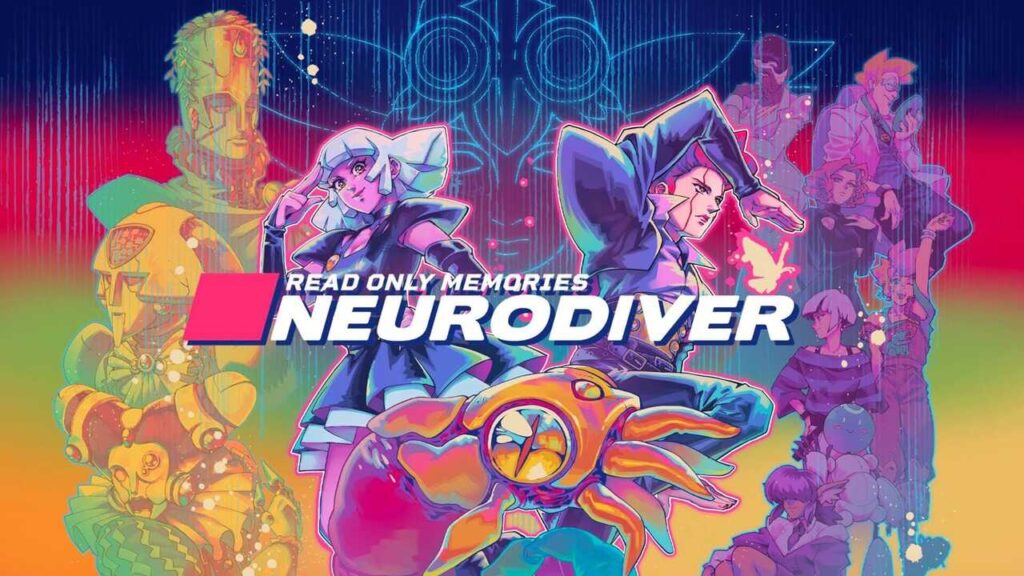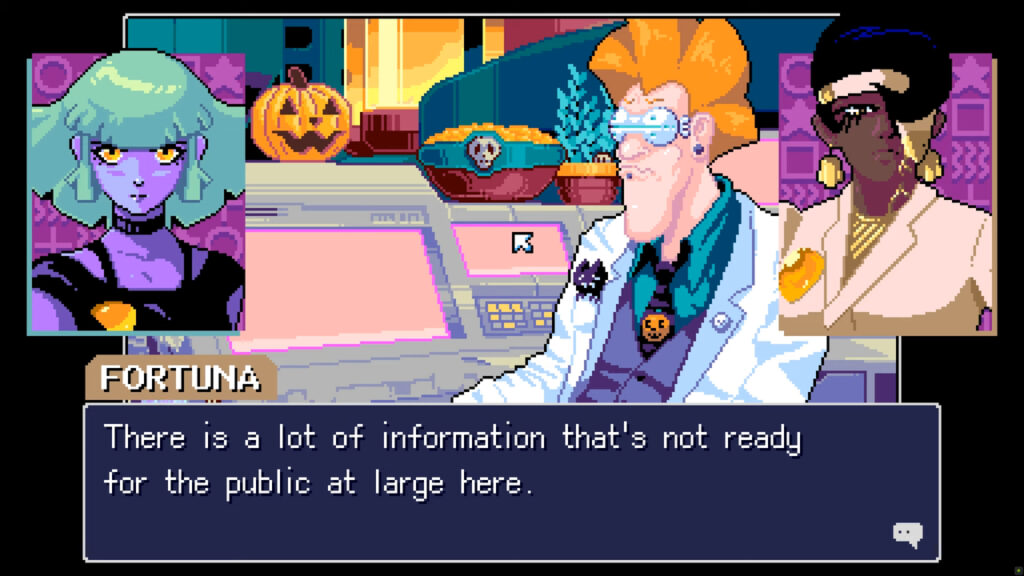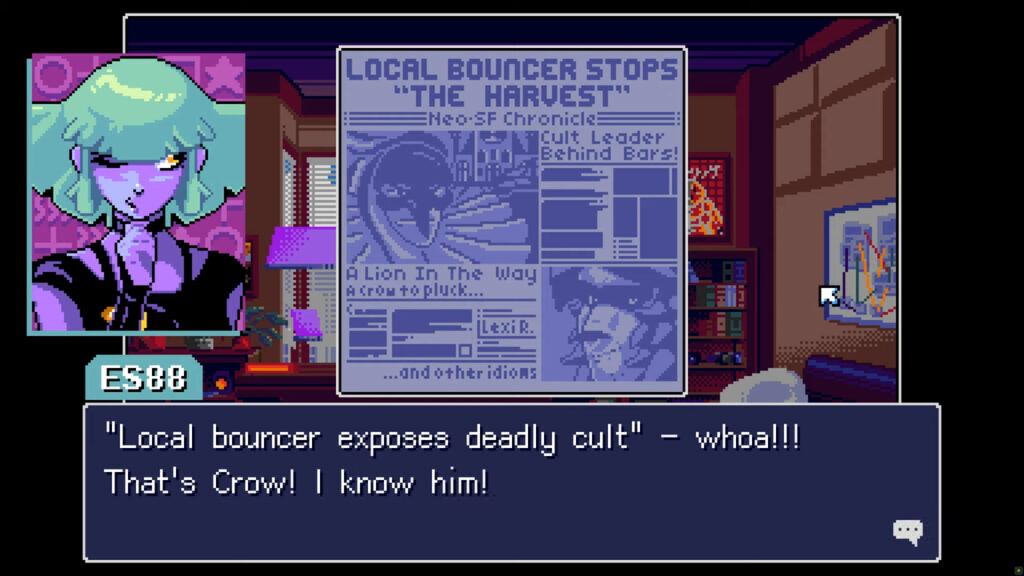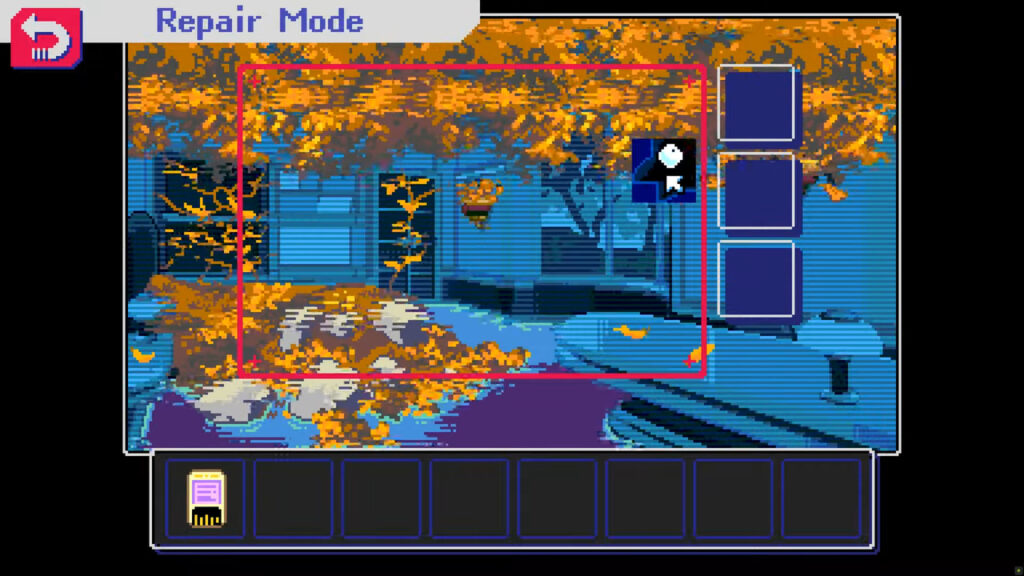
Developer: MidBoss, LLC,
Publisher: MidBoss, LLC, Chorus Worldwide, Serenity Forge
Platform: PC, PS4, PS5, Xbox One, Xbox Series X|S, Switch
Tested on: PC
Read Only Memories: Neurodiver – Review
A couple of years ago, one of our fellow reviewers took a closer look at 2064: Read Only Memories, an acclaimed point-and-click/visual novel hybrid. The game was successful enough to warrant a sequel, Read Only Memories: Neurodiver. Now, we’re not familiar with 2064 ourselves, but according to the game’s Steam page, this stand-alone sequel serves as a good starting point for newcomers anyway, thanks to the viewpoint of an entirely new protagonist. Meanwhile, returning veterans can see what the characters from the previous game have been up to six years after 2064. Since we’re in the former category, we’re looking at Neurodiver through fresh eyes. Let’s dive in -pun intended-, shall we?
Story
Earth, the year 2070. This not-too-far-off future version of our home planet may seem alien to us readers back in 2024, but for Luna navigating a city filled with androids and genetically modified humans feels as familiar as it gets. Luna, or ES88 as her clients refer to her, is a so-called Esper, a psychic able to literally dive into the memories of others, with the help of the titular Neurodiver. What’s a Neurodiver, you ask? Well, it’s a squid-like creature that latches onto your arm and is then able to visualize events from your past, even if you’ve forgotten them. The unlikely duo of ES88 and the Neurodiver are agents of MINERVA, a defense organization that is tasked with dealing with rogue Espers. ES88 is a rookie in the organization, although she’s very enthusiastic about dedicating her services to helping people, under the guidance of her partner Gate. The game’s opening minutes get a ton of exposition out of the way. Fortunately, the cast of characters is charming enough to quickly pull you into Neurodiver’s world, and before you know it, you don’t blink twice when you read about people deliberately turning themselves into human-animal hybrids. It’s just a part of life in the future.
The overarching plot involves the enigmatic criminal known as the Golden Butterfly, who has scrambled up the memories of a varied cast of characters. It’s up to ES88 and the Neurodiver to restore everything to normal. Admittedly, the Golden Butterfly plot acts more like a framing device that ties together the individual stories of the different characters that ES88 meets, and their scrambled memories that need fixing. In this regard, Neurodiver is character-driven, and while not every encounter is equally fleshed out, as a whole this setup works. It allows the story to touch on a variety of themes, ranging from gender norms to the power corporations hold over society. While the story is set in the future, these themes obviously mirror some of today’s societal struggles. Don’t think that Neurodiver is a depressing affair, however, as things are handled in a lighthearted manner and offset against ES88’s bubbly personality.
Graphics
Much of Neurodiver’s appeal comes from the visuals. The game’s pixel art lovingly whips up an ‘80s cyberpunk aesthetic with a dash of anime for good measure. The game’s vibrant color palette and expressive character portraits are representative of how ES88 sees the world, and are effectively juxtaposed against the bleak and dystopian events of the story. Neurodiver also uses its visuals to relay more pronounced emotions to the reader by having the text glitch out when a character is angry or make a wavy movement when a character is excited. It’s a simple but effective way to underline character responses.
Sound
A significant chunk of Neurodiver’s story is voiced, with the cast deliberately hamming up their performances. ES88 looks at the world through the wide-eyed lens of an excited child, audibly enthusiastic about the most mundane things. The over-the-top voice work occasionally leads to strange moments in the game, where the emotions of a voice performance don’t really line up with the on-screen events, but overall the cast does a good job with the material. The real audio highlight is the chiptune soundtrack, however, which fits perfectly within Neurodiver’s ‘80s-style retro-futuristic universe.
Gameplay
If you’ve been with us for a while, then you’ll know that we typically don’t have a lot to say about visual novels’ “gameplay”. That is because the majority of them can’t really be considered actual *games*, of course. Their interactive elements are typically limited to making choices that determine the direction of the story. In the case of Neurodiver, things are slightly different, however. There are games out there, like Famicom Detective Club or the Ace Attorney series, that sit comfortably in the intersection between visual novels and point-and-click adventure games. Developer Midboss LLC’s latest release doesn’t quite sit in the same spot as those games, but if there was another grey area between the aforementioned examples and classic visual novels like Fault – StP – Lightkravte, that’s where you’d find Neurodiver. In practice, this means that you’ll occasionally need to solve simple object-based puzzles where you need to click around the environment to find the items necessary to unscramble a memory. Even so, we’d estimate that roughly 80% of Neurodiver sticks to the classic visual novel formula.
Clocking in at around 5 hours, Neurodiver can be completed over the course of a single evening. Although there are a handful of choices to be made during the story, the game is surprisingly lacking in replay value, as the differences we noticed on a second attempt turned out to be insignificant overall. To make matters worse, Neurodiver missed one of the most basic visual novel features: the good old “skip read text” button. This means that if you did want to see everything present here, you’d simply have to replay the entirety of the game at the “normal” pace. And while we did enjoy our first playthrough of Neurodiver, there simply isn’t enough here to warrant a second playthrough or even to justify the €14.79 price tag. It’s a shame because Neurodiver is far from bad. Instead, it was over all too soon and left us wanting more.
Conclusion
After seeing the credits roll, we’re not sure what to think about Neurodiver. We genuinely enjoyed our glimpse into Neurodiver’s retro-futuristic world, but in all honesty, the game doesn’t capitalize on its potential. The presentation is gorgeous, the cast is likable, and there are sprinkles of great moments throughout the story. However, the overarching narrative seems like an afterthought and things could have been fleshed out far more when it comes to branching content and puzzle gameplay. The game’s lack of replay value also hurts, although this is more reflected in that it feels overpriced for what it is. Perhaps we should give 2064 a chance next, as the connections between both games may deepen the experience should we eventually return to Neurodiver.
1 Comment
Leave a Reply
You must be logged in to post a comment.









[…] has been a hot minute since we last reviewed a visual novel, with Neurodiver, and even longer since we took a look at a *traditional* visual novel, with Sunny Café. As such, […]